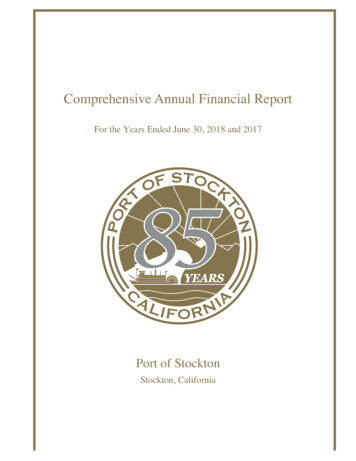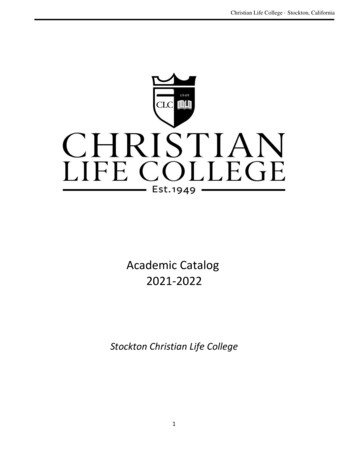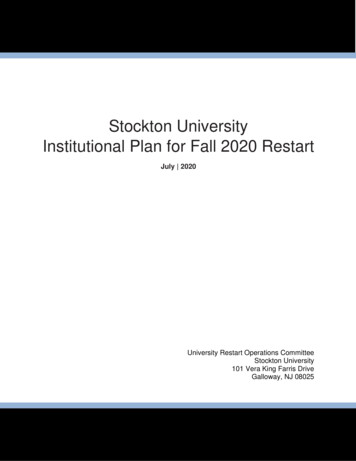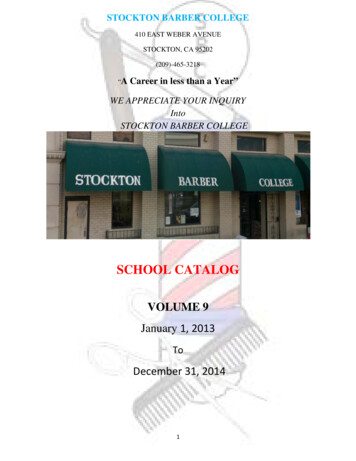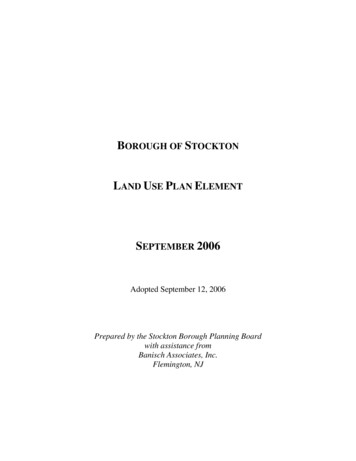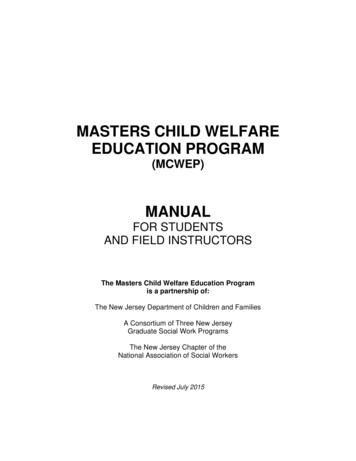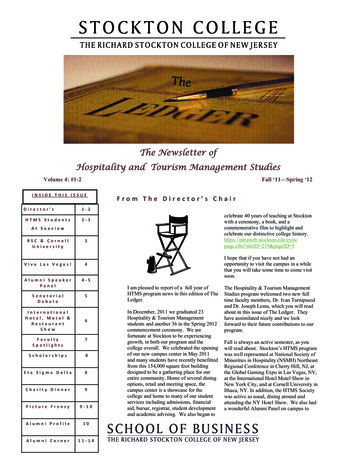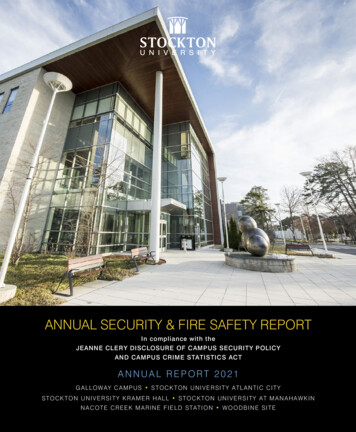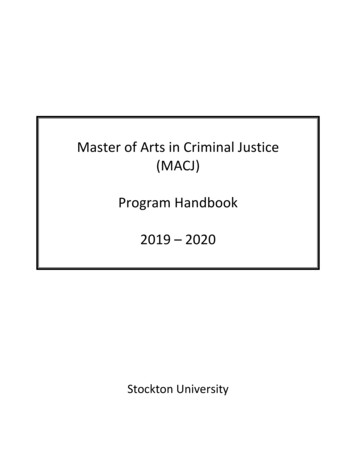
Transcription
Master of Arts in Criminal Justice(MACJ)Program Handbook2019 – 2020Stockton University
Table of ContentsCONTACT INFORMATION . 3EMERGENCY CLOSINGS . 3ACCOMMODATIONS FOR STUDENTS WITH SPECIAL NEEDS . 3STUDENT HEALTH AND WELLNESS SERVICES . 4FACULTY . 4Adjunct Faculty . 5PROGRAM MISSION STATEMENT . 6PROGRAM OBJECTIVES . 6Administration and Leadership Track Mission Statement and Objectives . 8Forensic Psychology Track Mission Statement and Objectives. 9Homeland Security Track Mission Statement and Objectives . 10Justice Studies Track Mission Statement . 11ADMISSION REQUIREMENTS . 11Traditional Entry into the MACJ Program . 11Direct Entry into the MACJ Program . 11Traditional Entry into the Certificate Program. 12Direct Entry into the Certificate Program . 12Non-Degree Option . 12Transfer Credit . 13DEGREE REQUIREMENTS . 13CURRICULUM . 13Core Curriculum . 13Administration and Leadership Track Curriculum. 14Forensic Psychology Track Curriculum . 14Homeland Security Track Curriculum . 14Justice Studies Track Curriculum. 14CERTIFICATE REQUIREMENTS . 15CERTIFICATE CURRICULUM . 15Administration and Leadership Certificate Curriculum. 15Forensic Psychology Certificate Curriculum . 15Homeland Security Certificate Curriculum . 16COMPREHENSIVE EXAM. 16Purpose of the Exam . 16Eligibility for the Exam . 16Timing of the Exam . 17The Exam. 171
Passing the Exam . 17Grading the Exam. 18Retaking the Exam . 18Academic Integrity . 18Exam Preparation. 19ACADEMIC PROGRESS . 19Remedial Form for Academic Improvement . 19PROGRAM COMPLETION TIMELINE . 20Maintenance of Matriculation . 20Leave of Absence . 20GRADING SYSTEM . 20WITHDRAWAL . 21INCOMPLETES . 21GRADE APPEALS AND GRIEVANCES . 21AWARDS AT GRADUATION . 21PARTICIPATION IN COMMENCEMENT ACTIVITIES . 22ACADEMIC HONESTY . 22GRADUATE STUDENT CODE OF CONDUCT . 22Graduate Faculty Review Committee . 23RESEARCH AND ETHICS . 23GRADUATE INTERNSHIPS . 23Eligibility Requirements . 24Application Process . 24Internship Requirements . 25Registration . 26Internship Deadlines . 26Restrictions Related to Internships . 27GRADUATE ASSISTANTSHIPS . 27Eligibility . 27Responsibilities and Compensation . 27Application . 28Nomination of Awards . 28Appendix A: MACJ Curriculum Worksheet. 29Appendix B: Certificate Curriculum Worksheet . 302
CONTACT INFORMATIONMailing Address:Coordinator, Master of Arts in Criminal JusticeSchool of Social and Behavioral Sciences101 Vera King Farris DriveGalloway, NJ 08205Dean of the School of Social and Behavioral Sciences:Marissa P. Levy, Ph.D. (Rutgers University)H-201(609) 652-4512Marissa.Levy@Stockton.eduDirector of the Office of Graduate Studies:AmyBeth Glass, Ed.D. (Rowan University)F-101(609) 626-3640AmyBeth.Glass@Stoctkon.eduProgram Coordinator:Deeanna M. Button, Ph.D. (University of Delaware)Associate Professor of Criminal Justice(609) 652-4452Deeanna.Button@Stockton.eduEMERGENCY CLOSINGSIn the event of severe weather or other types of emergencies, check the University’s websitefor information on class cancellations. Area radio and television stations may also announce thestatus of the University.ACCOMMODATIONS FOR STUDENTS WITH SPECIAL NEEDSIn accordance with the Americans with Disabilities Act of 1990 as amended and Sections 504and 508 of the Rehabilitation Act, students with a documented disability who needaccommodations are encouraged to register with the Learning Access Program (LAP).Registration for support services is strictly voluntary and confidential. Support servicesprovided by LAP are meant to help students devise strategies for meeting the University’seducational demands and to foster independence, responsibility, and self-advocacy. TheLearning Access Program can be found on campus in room J-204 or online atwww.stockton.edu/LAP. Please call 609-652-4988 or send an email to LAP@Stockton.edu formore information. Once a student has received an accommodation letter from LAP, they3
contact the course instructor to privately discuss needs as soon as possible to ensure thatreasonable accommodations are implemented.STUDENT HEALTH AND WELLNESS SERVICESThe Wellness Center offers basic health services to students, access to a nutritionist and healtheducator, and individual and group counseling. Health Services personnel can be reached byphone at 609-642-4701 and are located in WQ-108. The Counseling Center’s number is 609652-4722 and is located in J-204.FACULTYJess Bonnan-White (2012), Associate Professor of Criminal Justice; Ph.D., University of Iowa;M.A., Northern Illinois University; B.A., Washington University in St. Louis: Homeland security,emergency management, crisis response, humanitarian assistance, quantitative and qualitativedata analysis, research methods, human security.Deeanna M. Button (2012), Associate Professor of Criminal Justice; Ph.D., University ofDelaware; M.A., B.S., Old Dominion University: Social inequality, violence/victimization, genderand sexuality, LGBTQ youth and resiliency, criminology, research methods and statistics.Joshua D. Duntley (2006), Associate Professor of Criminal Justice; Ph.D., University of Texas;M.A., B.A., State University of New York at Plattsburgh: Evolutionary psychology, forensicpsychology, homicide, stalking, victim defenses, human mating, statistics.Susan Fahey (2010), Associate Professor of Criminal Justice; Ph.D., M.A., University ofMaryland, University Park; B.A., American University: Terrorism, hate crime, white supremacy,political instability, governance and legitimacy, criminological theory, quantitative data,research methods, statistics, transitional justice.Ian Finnimore (2019), Assistant Professor of Criminal Justice; Ed.D., Wilmington University;M.A., Rowan University; B.A., Kean University: Forensics investigations, medicolegal deathinvestigations, crime scene leadership, criminal justice.Ethan Czuy Levine (2019), Assistant Professor of Criminal Justice; Ph.D., Temple University,M.A., The New School for Social Research, B.S., Northeastern University: Sexual violence,intimate partner violence, victim services, gender and sexuality, feminist theory, socialconstruction of knowledge, quantitative and qualitative methods.Marissa P. Levy (2004), Professor of Criminal Justice; Ph.D., M.A., Rutgers, The State Universityof NJ; B.A., The Richard Stockton College of New Jersey: Environmental criminology withemphasis on spatial analysis of crime (crime mapping and crime prevention), evaluations andstatistics.4
Ruibin Lu (2018), Assistant Professor of Criminal Justice; Ph.D., M.A., Washington StateUniversity; B. Law, Nankai University (China): Specialty courts, U.S. judicial system, drug andalcohol use, community corrections, policy evaluation, comparative criminal justice.Manish Madan (2013), Associate Professor of Criminal Justice; Ph.D., Michigan State University;M.S., Memorial University, Newfoundland Canada; M.Sc., University of Delhi, Delhi India;B.Sc.(Hons.) Mathematics University of Delhi, Delhi, India: International and comparativeresearch, gender policy, sexual harassment, sexual assault, victimization, media, policing,research methods, statistics.William J. McKnight III (2017), Visiting Instructor of Criminal Justice; M.S., Saint Joseph’sUniversity; B.A., Stockton University; Certified Public Manager, The State of New Jersey; FBINational Academy 162nd Session, Quantico Virginia: Police leadership, policing, the criminaljustice system, homeland security, risk management and mitigation, business continuity.Richard Mulvihill (2011), Tenured Instructor of Criminal Justice; M.Sc., Nova SoutheasternUniversity; B.A., The Richard Stockton College of New Jersey: Police and public safetyadministration, corrections, and criminal justice technology.Joshua Reynolds (2017), Visiting Assistant Professor of Criminal Justice. Ph.D. University ofWyoming, M.A. University of North Dakota, B.A. Southern Oregon University: Exploitativestrategies and decision making, self-control, homicide, forensic/legal psychology, statistics,methodology.Nusret Sahin (2018), Assistant Professor of Criminal Justice; Ph.D., M.A., Rutgers University, TheState University of NJ; M.A., John Jay College of Criminal Justice; M.A., B.A. Turkish NationalPolice Academy: Police legitimacy and procedural justice, police-citizen encounters, policetechnology, terrorism, statistics.Kimberley R. Schanz (2017), Assistant Professor of Criminal Justice; Ph.D., CUNY GraduateCenter; M.A., John Jay College of Criminal Justice; B.A., Providence College: Behavioral crimescene analysis with an emphasis on the behavioral aspects of sexual assaults, the CSI effect,forensic psychology.Christine Tartaro (2000), Professor of Criminal Justice; Ph.D., M.A., Rutgers, The StateUniversity of NJ; B.A., The College of New Jersey: Corrections, research and evaluation, policyand planning, suicide in correctional facilities, mental illness and the criminal justice system.Adjunct FacultyRobert Heinrich, Ed.D. (Stockton University)Robert.Heinrich@stockton.eduAreas of interest: CybercrimeNicole Nelson, Ed.D. (Stockton University)Nicole.Nelson@stockon.eduAreas of interest: Policing, OrganizationalPsychology5
For faculty office hours, please refer to course syllabus or contact the School of Social andBehavioral Sciences (SOBL). SOBL is located in office H-201. The phone number is (609) 6524512.PROGRAM MISSION STATEMENTThe Master of Arts in Criminal Justice (MACJ) program at Stockton University provides a qualitygraduate education that promotes advanced inquiry and application of new knowledge tofoster advanced-level career opportunities. The program aims to serve the criminal justiceeducational and research needs in the southern New Jersey area. Program faculty participatein research and service activities that benefit criminal justice and social service agencies locally,statewide, and nationally. The faculty’s involvement in research and community affairsenhances the classroom experience, as faculty members are able to engage students indiscussions of current dilemmas and controversies in the field. The program provides studentswith the education needed to advance in the practitioner realm of criminal justice; it alsoprepares those who want to continue with their education through developing research andanalytical skills needed to pursue those goals.PROGRAM OBJECTIVESThe faculty of the MACJ program will emphasize dialogue, critical thinking, policy evaluation,and clear and effective written and oral communication of ideas. Specifically, students will:1. Gain knowledge, insight, and sensitivity to occupy professional positions in public andprivate criminal justice agencies or prepare for continuation of graduate work inCriminal Justice or related field.2. Apply criminal justice theories, concepts, or principles to criminological problems.3. Use relevant data, information sources, and applied principles of data analysis toenhance understanding of the criminal justice system.4. Gain greater understanding of all branches of the criminal justice system and issuesconfronting these branches.5. Learn theoretical and practical issues related to the administration and management ofcriminal justice organizations.6. Appreciate political and ethical dilemmas confronting the process of designing orevaluating effective criminal justice policy.7. Learn how the scholarly community contributes to understandings of current issuesfacing the criminal justice system.The curriculum map below in Table 1 provides a display of program learning objectives (bynumber) met by each core course.6
Table 1. Program Objectives Curriculum Map5206 Criminological Theory5214 Corrections5222 Victimology5250 Law Enforcement and Policing5315 Crime Data and Analysis5316 Graduate Research and Evaluation in Criminal Justice5410 Criminal Justice Policy and Planning5420 Judicial Process(1) (2) (3) (4) (5) (6) (7)XXXXXXXXXXXXXXXXXXXXXXXXXXXXXXXXThere are four academic tracks available to students: Administration and Leadership (ADML),Forensic Psychology (FPSY), Homeland Security (HOME), and Justice Studies (JUST). Tables 2through 4 provide curriculum maps that display program learning objectives met by the coursesin AMDL, FPSY, and HOME. Students in JUST take any four MACJ courses to meet trackrequirements.Table 2. Program Objectives Met by ADML Track5408 Criminal Justice Management & Leadership5460 Organizational Psychology5306 Geographic Profiling & Analysis5328 Cyber Crime5348 Drugs, Crime, & Criminal Justice5368 Crime and Place5509 Fundamentals & Theory of Emergency Management5540 Homeland Security Policy(1) (2) (3) (4) (5) (6) (7)XXXXXXXXXXXXXXXXXXXXXXXXXXXXXXXXXXXXTable 3. Program Objectives Met by FPSY Track5208 Forensic & Legal Psychology5210 Forensic Psychopathology & Treatment5225 Criminal Psychology & Profiling5306 Geographic Profiling & Analysis5348 Drugs, Crime, & Criminal Justice5460 Organizational Psychology5368 Crime and Place5328 Cyber Crime(1)XX(2)XXXXXXX(3)(4)X(5)XXXXXXXXXX(6) (7)XXXXXXXXXXXXX7
Table 4. Program Objectives Met by HOME Track5505 Terrorism5509 Fundamentals & Theory of Emergency Management5306 Geographic Profiling & Analysis5328 Cyber Crime5408 CJ Management & Leadership5540 Homeland Security Policy5368 Crime and Place5521 Borders & Displacement(1)XXXXXXXX(2)XX(3) (4)XXXXXXXX(5)(6) (7)XXXXXAdministration and Leadership Track Mission Statement and ObjectivesCriminal Justice Administration encompasses a wide range of professional activities, including,but not restricted to, law enforcement, corrections, court administration, emergencymanagement, homeland security planning, victim services, government relations, and legalpolicy. Criminal Justice Administration practitioners engage partners in governmental and nongovernmental agencies at the federal, state, and local levels. Increasingly, Criminal JusticeAdministration is challenged to become global in nature and scope. Graduates of the track willnot only examine theoretical origins of criminal justice policy and practice, they will alsoexercise research and evaluation skills and develop key capacities in leadership andmanagement. Given the diverse working environment in Criminal Justice Administration,Stockton provides students with unique exposure to an interdisciplinary knowledge base andfaculty with experience in both domestic and international contexts. Along with programobjectives, ADML track objectives include:1. Students will be able to discuss the roles and responsibilities of the key public andprivate sector players in the management of criminal justice agencies and/or nationalsecurity at the local, state, and federal levels.2. Students will be able to identify key differences between private and publicadministration.3. Students will learn about the legal, political, and ethical issues facing policy-makersadministrators in the criminal justice field.4. Students will understand the importance of a creating a diverse workforce to serve adiverse community.5. Students will understand the impact of unions and collective bargaining agreements aswell as due process rights under civil service and other regulations.6. Students will understand the critical shift that takes place in leadership roles duringtimes of crisis.7. Students will be able to identify new developments and technologies and assesswhether they will bring value to their organizations8
The curriculum map in Table 5 displays ADML learning objectives met by each ADML course.Table 5. ADML Objectives Curriculum Map5408 Criminal Justice Management & Leadership5460 Organizational Psychology5306 Geographic Profiling & Analysis5328 Cyber Crime5348 Drugs, Crime, & Criminal Justice5368 Crime and Place5509 Fundamentals & Theory of Emergency Management5540 Homeland Security Policy(1) (2) (3) (4) (5)XXXXXXXXXXXXXXXXXXX(6) (7)XXXXXXXXXXXXForensic Psychology Track Mission Statement and ObjectivesForensic psychology is an important field in the social and behavioral sciences. It explores theapplication of the science and the profession of psychology to questions and issues relating tocrime, the law, and legal systems. In addition to program objectives outlined above, studentswill gain broad knowledge of the role of psychology in the criminal justice system, including:1. The commission of crime, from its origins to the cognitive processes that drive itsbehavioral patterns.2. The investigative process from decision making to mental health treatment of police3. The assessment and treatment of criminal and civil actors4. The civil and criminal legal process from initiation to verdict for both offenders andvictims5. The post-legal process from incarceration to post-release6. The unique ethical and professional issues of psychologists working within the criminaljustice system7. The organization of societies, institutions, and systems of criminal justice.The curriculum map in Table 6 displays FPSY learning objectives met by each FPSY course.Table 6. FPSY Objectives Curriculum Map5208 Forensic & Legal Psychology5210 Forensic Psychopathology & Treatment5225 Criminal Psychology & Profiling5306 Geographic Profiling & Analysis5348 Drugs, Crime, & Criminal Justice5460 Organizational Psychology5368 Crime and Place5328 Cyber XX(7)XXXX9
Homeland Security Track Mission Statement and ObjectivesThe homeland security field endeavors to protect the United States, its people, and resourcesfrom attack by terrorists or criminal enterprise and from a wide range of natural disasters. Thisfield includes federal, state, and local government agencies and private firms. The homelandsecurity curriculum will address the protection of the United States from natural disasters,man-made crises, and terrorist attacks. Graduates of the track will be able to execute threatassessments of man-made and natural disasters, will be able to assess and evaluate thedomestic and international terrorist threat and will be able to suggest and write on policies toameliorate these threats. Keeping with Stockton’s tradition of interdisciplinary offerings, thetrack will draw on work from people who are experienced in criminology and criminal justice,the law, field experience, and political science. In addition to program objectives outlinedabove, the following are objectives of the HOME Track:1. Students will understand the “all hazards” approach to emergency management.2. Students will be able to explain why there are so many different definitions of terrorismand how this influences what we know about terrorism.3. Students will learn about the typologies of terrorism and explore the evolution ofterrorism movements in the United States and around the world.4. Students will synthesize backgrounds and motivations of different types of politicalviolence and apply their knowledge to discuss likely future evolutions and global hotspots of terrorism.5. Students will be able to discuss the roles and responsibilities of the key players indisaster management/homeland security at the local, state, and federal levels.6. Students will demonstrate knowledge of vulnerability identification and risk reductionprocesses.7. Students will learn about the legal and ethical issues facing policy-makers and staffmembers in the homeland security field.The curriculum map in Table 7 displays HOME learning objectives met by each HOME course.Table 7. HOME Objectives Curriculum Map5505 Terrorism5509 Fundamentals & Theory of Emergency Management5306 Geographic Profiling & Analysis5328 Cyber Crime5408 CJ Management & Leadership5540 Homeland Security Policy5368 Crime and Place5521 Borders & Displacement(1) (2) (3) (4) (5) (6)XXXXXXXXXXXXXXXXXXXX(7)XXXXXX10
Justice Studies Track Mission StatementJustice studies allows students to study the field of criminal justice from a broad perspective.Graduates of the Justice Studies track benefit from the depth of information on criminal justicerelated issues provided from the core curriculum, while also gaining the advantage of breadthof knowledge from a flexible curriculum. In addition to program objectives outlined above,students in this track will use a theoretical lens when employing research and evaluation skillsto develop key capacities in their own area of unique interests.ADMISSION REQUIREMENTSStockton offers a Master of Arts in Criminal Justice degree and certificates in Administrationand Leadership, Forensic Psychology, and Homeland Security. Interested students may apply tothe full program or certificate programs through traditional or direct entry. Students may alsotake MACJ courses as a non-matriculated student through the non-degree option.Traditional Entry into the MACJ ProgramThe following are the admissions requirements for traditional entry into the full MACJ program.Traditional entry is for a) candidates with BA/BS degrees from other colleges, b) candidates whograduated from Stockton over a year prior to their application to the graduate program, and c)candidates who graduated from Stockton, but do not qualify for direct entry. A cumulative GPA of 3.0 or higher; Completion the following prerequisites, with minimum grade requirements met:§ CRIM 1100 with a C or better;§ CRIM 2141 or equivalent research class with a C or better;§ CRIM 2145 or equivalent statistics class with a C or better; Forensic Psychology Track students must also have completed PSYC 1100 with a C orbetter on the first attempt of the class
private criminal justice agencies or prepare for continuation of graduate work in Criminal Justice or related field. 2. Apply criminal justice theories, concepts, or principles to criminological problems. 3. Use relevant data, information sources, and applied principles of data analysis to enhance understanding of the criminal justice system. 4.

